#fish drying innovations Kenya
Explore tagged Tumblr posts
Text
The Role of Hybrid Solar Dryer Initiative in Combating Aflatoxins in Kenyan Fisheries
“Discover how Kenya’s Lake Victoria fisherfolk are benefiting from hybrid solar-biomass dryers to reduce postharvest losses and aflatoxin contamination in omena fish. Learn about JKUAT’s USAID-funded project and its impact on food security and economic empowerment.” Fisherfolk along the shores of Kenya’s Lake Victoria will soon benefit from a new research initiative that will improve the…
#aflatoxin contamination#aflatoxin prevention#African fisheries#climate-resilient technology#economic empowerment#fish consumption patterns#fish contamination#fish drying advancements#fish drying advancements Kenya#fish drying benefits#fish drying benefits Africa#fish drying best practices#fish drying best practices Kenya#fish drying case study#fish drying case study Africa#fish drying challenges#fish drying challenges Kenya#fish drying efficiency#fish drying efficiency Africa#fish drying equipment#fish drying equipment Kenya#fish drying future#fish drying future Africa#fish drying impact#fish drying impact Africa#fish drying innovations#fish drying innovations Kenya#fish drying methods#fish drying methods Africa#fish drying optimization
0 notes
Photo

Illustration Photo: Manioc drying during a workshop on manioc transformation held in Yangambi - Congo DRC (credits: Axel Fassio/CIFOR-ICRAF / Flickr Creative Commons Attribution-NonCommercial-NoDerivs 2.0 Generic (CC BY-NC-ND 2.0))
NextWorldNow Community Investments — Community Grants 2023
We invest in and support community development projects requiring modest capital. We fund projects that are owned by the local community, whose social impact and return on investment can be measured, and whose success can be sustained. In the spirit of innovation, we aim for a diverse "portfolio" of projects and geographies to spread creative solutions.
We work to discover and apply best practice social investment models on a small scale personal level. Our process invites ongoing direct connection with the sponsored community rather than an anonymous one-time donation. We believe it is possible to invest in projects that increase the wellbeing of communities while avoiding unintended harm. We operate with minimal overhead and a goal of funneling nearly 100% of grant resources to the intended community project.
Projects funded to date:
Ukraine (2022) - skill training for Roma women: professional sewing and entrepreneurship, psychosocial support
Ghana (2022) - ecotourism: development of visitor center at local natural resource area (waterfalls and caves)
Tanzania (2022) - agronomic and business training for biofortified crop production
Nicaragua (2021) - water system enhancement for small rural community, solar pumps
Rwanda (2021) - food processing center for women's coop farmers
Suriname (2020) - local fish farm for food security and commercial marketing
Ecuador (2020) - electronic medical record (EMR) for a rural health clinic
Columbia (2019) - "vertical farming" urban agribusiness prototype
Zimbabwe (2019) - commercial tea and medicinal products from Resurrection plant
Uganda (2018) - low pressure drip irrigation system using drought resistant seed crops
Philippines (2018) - taro root cultivation and processing for commercial sales (taro chips)
Mongolia (2017) - greenhouses to support seasonal food production and produce marketing
India (2017) - skill training: silk weaving, reeling, embroidery, and business management
Kenya (2016) - solar powered computer lab for rural community school, students & adult learners
Zambia (2015) - four rural health clinic facilities for expecting mothers
Application Deadline: March 1, 2023
Check more https://adalidda.com/posts/wzto2RN2qReNmXfc2/nextworldnow-community-investments-community-grants-2023/call
0 notes
Text
Aalto-Helsinki 2020 is here, come meet us!
The time has come for Aalto-Helsinki 2020 to finally take over the blog! Despite the COVID-19 situation, we have been busy with planning our project since February. We have brainstormed, read countless scientific articles, contacted experts and companies and had a lot of online meetings.
Now let us introduce ourselves:
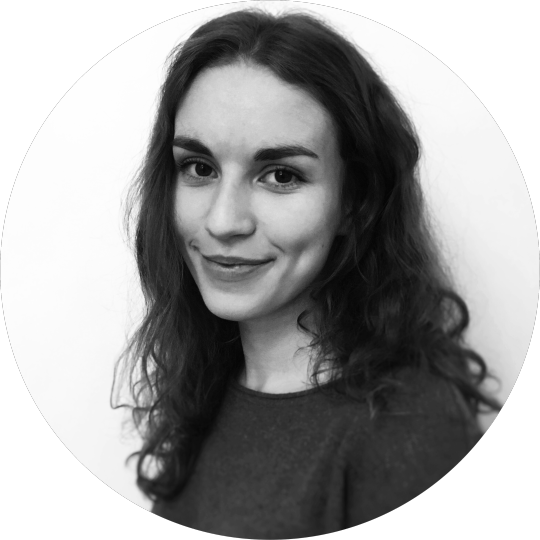
Tytti
I did my Bachelor's degree in Biotechnology and Chemical Engineering and decided to continue with Biotechnology to the Master’s studies. What fascinates me the most about biotechnology is that we can study and engineer the tiniest components of life and at the same time do industrial scale production with them. I applied to iGEM because I’m very interested in entrepreneurship and this project mimics all the different elements that are needed to develop a business. Apart from science, my favourite things in life are playing the guitar, spending time in nature and enjoying tea.
An adventurous trip you have been on? My most recent adventurous trip was to Norway because I had always wanted to visit the Arctic Ocean. There was this fishing boat where some Finnish guy had designed a sauna among other unusual things. After warming up in that sauna, I jumped from the deck to the ice-cold water. It was cool to actually experience the Arctic Ocean fully!
Your most extraordinary skill? Making perfectly thin “muurikka” crepes
What is your favourite board game? Pandemic, rising tide version.
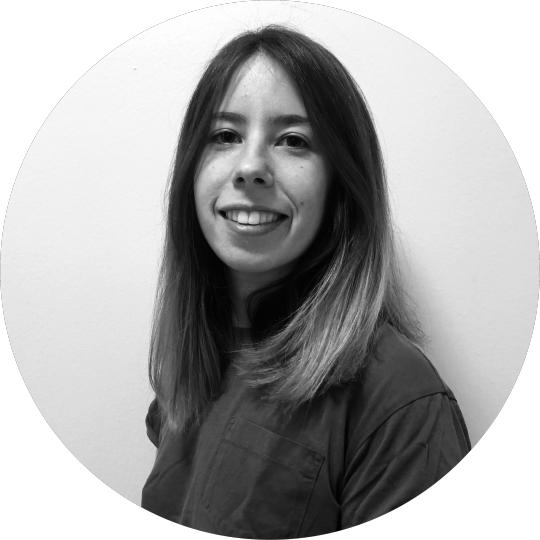
Carla
I am currently studying in the Ecology and Evolutionary Biology MSc program at the University of Helsinki. I completed my Bachelor’s degree in Genetics at Universitat Autònoma de Barcelona (UAB), in Barcelona, Spain. I have always been interested in Genetics and Evolution of organisms. I believe that a lot has still to be learnt about evolution mechanisms to make insights that can be applied to healthcare and medicine. In my free time I like to exercise, I am a bouldering enthusiast and I also try to go running as much as I can. I love watching movies as well. I applied to iGEM because it seemed the perfect opportunity to work with a multidisciplinary team and get to know people from different science fields. I consider myself an extroverted and curious person, so this could be the perfect opportunity to make new friends and learn from them. I thought it would also be the perfect opportunity to start a project on a topic of interest for all of us from scratch.
What is your favourite movie of all time? I don’t have a unique favorite movie, but my list of must watch movies is the following: Inception, Shutter Island, Green Book, The Good Will Hunting, The Shawshank Redemption, Jungle, Into the Wild, Mr. Nobody, Untouchable, Captain Fantastic, Interstellar, Donnie Darko, V for Vendetta and Dead Poets Society.
What kind of music do you listen to? I don’t only listen to one type of music, I like all types. Some international artists that I like are: Jonathan Wilson, John Frusciante, Steven Wilson, Eddie Vedder, Chet Faker, Gus Dapperton, Isaac Gracie, Billie Eilish, The Kooks, and Men I Trust among others. When talking about Catalan and Spanish music I usually listen to rumba, and rock, and also a bit of pop.
Your dream travel destination? My dream travel destinations would be: Iceland, Canada, Japan and Australia!
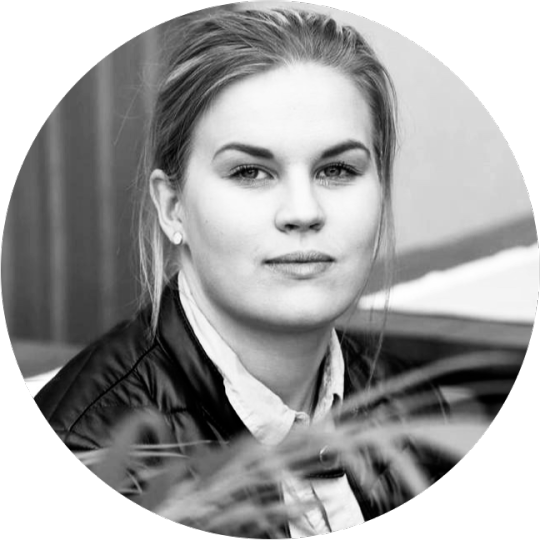
Amanda
I am studying at the Bachelor’s programme in Science in the chemistry study track at the University of Helsinki. In this year’s iGEM team I will work in the wet-lab but I am also involved with the funding, human practices and business. I applied to Aalto-Helsinki team to get the opportunity to take theory to practice and to learn a lot. In my free time I like cooking, baking, crocheting, knitting and gardening. I recently bought a greenhouse, where I will grow lots this summer!
What’s the most interesting or adventurous trip you have been on? Hard choice, but I would have to say the trip to Kenya with my family. So different and we saw a lot of animals and the whole Big Five!
What is your favourite board game now? And as a child? I think my favorite board game now is Dixit, but as a child I think it was Kimble.
Coffee or tea? Definitely tea, preferably green or white.
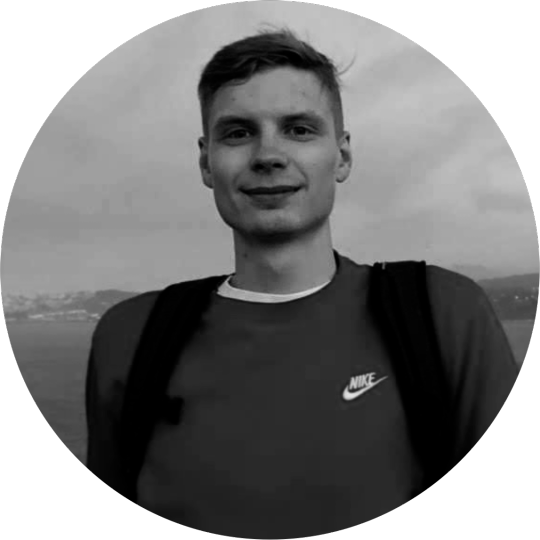
Artur
I study bioinformation technology at Aalto University. My minor is computer science. My role in our iGEM team is dry-lab and during the project I will be focusing on modelling as well as wiki development. I applied to iGEM because I wanted to be a part of a student driven team project and international competition. In my free time I enjoy programming, playing video games and going to the gym.
Your best tip to survive the quarantine? Outdoor activity, that does not require other people e.g. skateboarding and riding bicycle. Also playing video games with friends and watching tv series makes it easy.
What is your favourite movie of all time? Definitely Interstellar. After watching this for the third time I still get chicken skin. This almost three hour movie is a perfect combination of action, sci-fi and drama. Hans Zimmer did an astonishing job on music in this movie. I still keep one of the movie's soundtrack as my wake-up alarm. It's so good!
Who is your favourite scientist and why? Theoretical physicist Michio Kaku. I remember watching his show on Discovery Channel about black holes and teleportation. He got me interested in science and that's why he is my favourite scientist.

Daria
I am a second year master's student in Genetics and Molecular Biosciences, with focus on Molecular and Analytical Biosciences at the University of Helsinki. I have done my bachelor's in Biotechnology at the University of Silesia. I have experience in both environmental and biomedical research.
What was your favourite game to play as a child? Scavenger hunt. We lived right next to the forest, it felt good to be there for hours unsupervised.
What’s the grossest food you ever had to eat to be polite? Bananas. My culinary nemesis. Being grossed out by them is one of my earliest childhood memories.
What was the worst haircut you ever had? Bob at the age of 13. Thanks, mum.
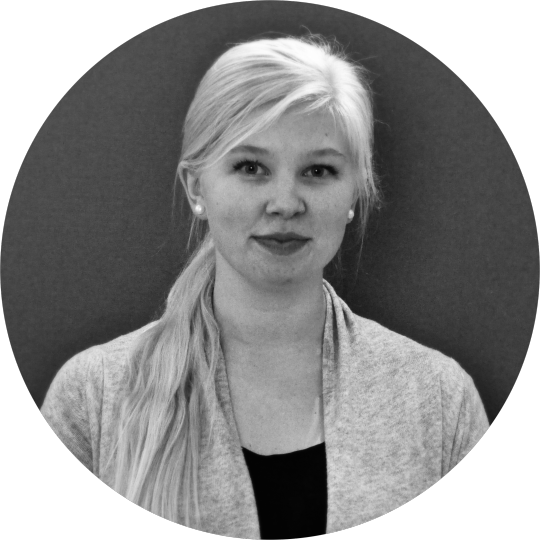
Emilia
I have a Bachelor’s degree in Biotechnology from Tampere University and I’m now continuing my MSc (Tech) studies at Aalto University School of Chemical Engineering, major in Biotechnology. In my free time, I work out at the gym and love to cook. Also, I enjoy being outside in nature and spending time with my family and friends. I applied to iGEM because of my passion for life sciences and interest in challenging myself. I wanted to be a part of a powerful team of young professionals who share the same goal to achieve something meaningful. iGEM is a unique opportunity to work in an interdisciplinary team and carry out a research project from start to finish. In this iGEM project, my main responsibility is working in the wet-lab and obtaining funding. I will also contribute to human outreach activities and updating the team’s social media. Furthermore, I hope to learn more about bioinformatics and modeling. I have some experience in biomedical research and I’m looking forward to expanding my knowledge in the field of synthetic biology during the iGEM project. In the future, I wish to work with innovations which would somehow improve the quality of life.
What is your favorite time of the day and why? I love quiet mornings. I want to enjoy my morning coffee in peace and start my day without rushing. On the other hand, I also love spectacular sunsets, especially during the summer in the Finnish archipelago.
Your dream travel destination? Iceland. I would love to get to experience its unique nature, geysers and hot springs.
Coffee or tea? Coffee, of course.

Gustav
I am currently finishing my first year of masters studies in biosystems and biomaterials engineering. I applied for iGEM since I have always been interested in cell mechanisms and the intriguing and complex principles behind these cellular-systems. In the Aalto-Helsinki team, I am primarily doing wet-lab and budgeting, which means that I’m currently mostly researching data and cell-mechanisms related to our project. I often find one hobby at a time for which I am very passionate until I get tired of it and eventually switch. Previous hobbies have included been sewing, chess and origami, but for the moment I most do horticulture.
What is your dream travel destination? I would love to see the Socotra Island and the strange species living there.
What makes you happy? A cup of good quality tea in the evening.
Cats or dogs? Both??
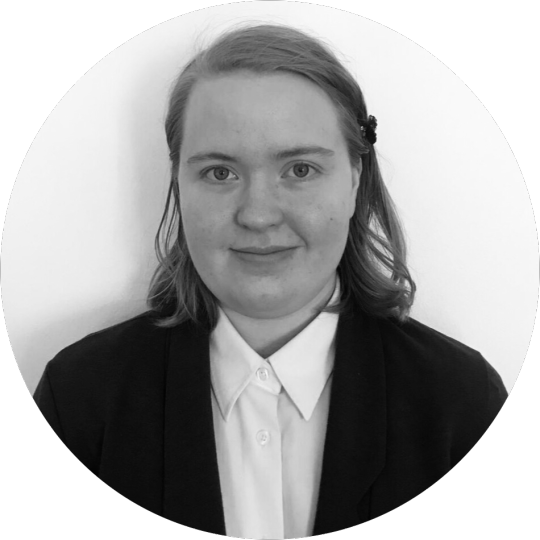
Julia
I study Molecular Bioscience at the University of Helsinki. My part in iGEM is mainly in the wet lab, but I also take part in social media and human practises. Outside of iGEM I enjoy reading and listening to music, as well as playing video games and D&D. I applied to iGEM because I wanted to do something different and concrete with my knowledge and skills. Besides molecular biology for the last year I’ve been studying Chinese and hope to be fluent in it one day.
Most interesting trip you have been on? A couple of years ago my friends and I went on a trip to Chongqing, China. The trip was very pleasant despite none of the locals knowing English, the hole in the outer wall of the room or there being no warm water for the first couple of days. One thing led to another and we somehow ended up as models for the hostel’s website, which meant a full-blown photoshoot with free drinks and food. Afterwards the hostel owner even treated us to delicious hot pot!
Also, the baby pandas were cute.
What is your favourite book of all time? The Invisible Library by Genevieve Cogman. The heroine of the story is refreshingly sensible, the plot innovative and the book builds an interesting world for the sequels. Would recommend to anyone who likes fantasy, paranormal, or is interested in librarians using spycraft to steal books from alternative worlds.
Coffee or tea? Most definitely tea. Jasmine tea is especially close to my heart.
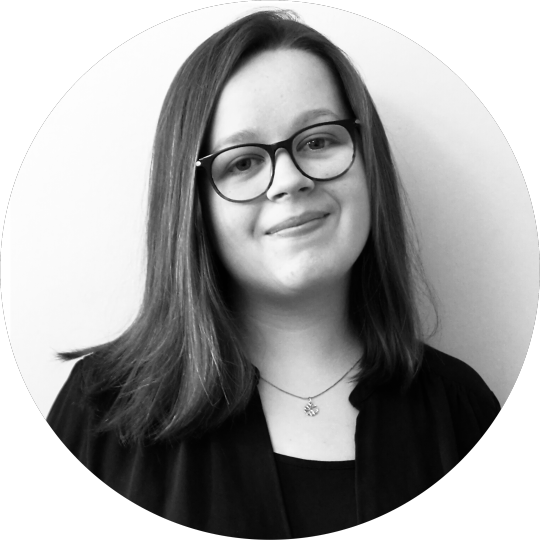
Maria
I am a third-year physics student from the University of Helsinki, majoring in theoretical physics and minoring in computer science. My main motivation for applying to iGEM was to apply my science skills to a real-world problem. I’m also eager to learn how research projects work. In our project I will focus on modelling, human practices and social media. Besides science, I love languages, especially French. In my free time I enjoy ballet, board games, walks and reading.
What fictional world would you love to visit? With all the chaos in the world currently, I’d love nothing more than to escape to Moominvalley. Moominmamma’s pancakes and a worry-free life sound really appealing. I’d also like to visit Hogwarts, I have been waiting for my letter since I was 10.
What skill would you love to master? I’d love to master flying, imagine all the freedom it would bring! However, all my attempts so far have failed. I wonder why that is.
What is your favourite board game? Probably Battlestar Galactica or Dale of Merchants.

Nata
I study Biosystems and Biomaterials Engineering in the program of Life Science Technologies at Aalto University. I completed my Bachelor's degree in Biotechnology and Chemical Technology. In this journey of iGEM, I'm responsible for Human Practice activities and taking part in the wet-lab work as well. In my free time, when I'm not passionately studying life sciences or being fascinated by nature, I keep myself active with group gymnastics, friends and family. I applied to iGEM to be part of the fascinating project in the field of synthetic biology. I'm sure that we will learn precious skills of planning, team working and presenting as well as meet many wonderful people! Currently beside the iGEM, I'm working with seedlings of tomatoes and herbs that I will relocate in my glass house when it gets warmer.
Describe your dream job: In my dream job, I would be able to utilize the field of life sciences to help people and the environment at the same time.
Your best tip to survive the quarantine? Your favourite movie of all time?
My tip to survive this quarantine would be to spend time in nature and watch as many movies as possible. One of the movies should definitely be my all time favourite: The Intouchables.
0 notes
Text
Climate change reality on hydropower: Zambia must innovate
…as a nation we cannot operate in a silo while the rest of the world innovates. The sun is still shining. It is time to mitigate and adapt. By Eng Geoffrey Chishimba Chiyumbe Hydropower became an electricity source in the late 19th century, a few decades after British-American engineer James Francis developed the first modern water turbine. In 1882, the world's first hydroelectric power plant began operating in the United States of America along the Fox River in Appleton, Wisconsin. Today, hydropower and thermoelectric power make up 98 percent of the world's electricity generation. These two most common forms of power are also the most water-intensive, which makes them extremely vulnerable to drought, competition over water resources and other water shortages. Hydropower is the most dominant renewable and low carbon energy source generating about 16% of the total world electrical energy. Hydropower generates energy from water and so any change in natural water circle caused by the climate change had and will have impact on the power generation (Dams convert falling water—mechanical energy— into electrical energy. Without water as in drought, there is no energy source to convert). The effect of climate change on hydropower is mostly influenced by the change of the river runoff. The change of precipitation and temperature are the most driving factors. Increase of the extreme climate events and enlarged erosion furthermore pressures the hydropower production. Increased temperature causes stronger water evaporation from the earth including from all water surfaces, streams, rivers and lakes. The evaporation reduces available river water, but at the same time more evaporated water origins in more precipitation. In 2016, the World Energy Council warned, "we will start to see the effects of water scarcity on energy supplies in the very near future." The effects are already starting to show, as evidenced by Kenya and India's droughts and subsequent power plant curtailments. This issue is not unique to one country or continent; power plants from Asia to Europe to Africa to the Americas are suffering due to water scarcity. It is a global problem. According to the World Preservation Foundation one third of the world’s major rivers and lakes are drying up, and the groundwater wells for 3 billion people are being affected. Assessing climate change impact studies conducted on the Zambezi River Basin, Dr. Richard Beilfuss, a professional hydrologist, said the Zambezi is expected to experience “drier and more prolonged drought periods”. Over the next century, rainfall is expected to decrease by between 10 and 15 percent over the basin, according to several studies cited by the Intergovernmental Panel on Climate Change. There will be a significant reduction in the amount of water flowing through the river system, affecting all eight countries it passes through. The water that feeds the river is expected to decrease by between 26 percent and 40 percent in another four decades, the study observed. In Zambia, we are still experiencing the ravaging and devastating effects of drought - Food production dropped, leaving millions of people without access to sufficient food. Some villagers have lost more than 50 percent of their livestock. Amidst the human tragedy of this drought, an unexpected actor faced impending shutdowns and economic losses due to water scarcity – the energy (electricity) sector. Indeed we see that the loss of rivers, lakes and underground water reserves are impacting the livelihoods of millions of people, hitting animals, farming and electricity production, as well as threatening to exacerbate climate change further through the release of CO2 and methane. Despite intense rainfall, world’s water supply is decreasing. Studies find that drying of soil due to rise in temperatures is not letting much water reach rivers and reservoirs. It is established that the main cause for the drying up of the lakes is drought caused by climate change impacting the inflow to the lake – resulting in significant reduction in water levels. Increased diversion for irrigated agriculture, the building of dams and reduced rainfall over the lake's surface, are also named as contributing factors. Cutting down of trees is also a problem causing the drying of soils in our catchments. Plants absorb water from the soil and evaporates it to form clouds. Deforestation leads to cutting down of trees and as a result less water is absorbed from the soil and this disturbs the water cycle. The formation of clouds becomes difficult which leads to reduced rainfall. Where once these were moist before a storm event allowing excess rainfall to run off into rivers—they are now drier and soak up more of the rain, so less water flows into our rivers. And drier soils means farmers need more water to grow the same crops. There is an undisputable evidence of ground water basins losing more water than being naturally replenished by rainfall. We have dry and diminished rivers all over Zambia that can be seen by many bridges constructed years ago after independence, to span a body of water underneath, today only service dry lands, where water once flowed. In 2014, while still working in South Africa, I read a disturbing report that Lake Mweru Wantipa, which was the main stay of the people of Kaputa and now Nsama district through fishing activities was drying at a very fast rate. I did my grade two education there at Kasongole primary school then, whilst under the guardianship of my maternal grandfather Dickson Chishimba, popularly known as Kapeyeye, who was the chief under Mukupa Katandula. Many people think of global warming and climate change as synonyms, but scientists prefer to use “climate change” when describing the complex shifts now affecting our planet’s weather and climate systems. Climate change encompasses not only rising average temperatures but also extreme weather events. In trying to harness the amazing power of moving water, we are confronted with increasing temperatures, lower water flow and alterations in the rainfall regime, factors which reduce total energy production from hydro power plants. So therefore with rising temperatures arising out of climate change, more water is evaporating from soils, in turn making the soil absorb more rainfall. Experts have wondered why despite the above studies and findings, Large dams are being built or proposed, typically without analysis of the risks from hydrological variability that are already a hallmark of African weather patterns, much less the medium- and long-term impacts expected from climate change. “None of these projects, current or proposed, has seriously incorporated considerations of climate change into project design or operation,” noted Dr. Richard Beilfuss. Dr.Beilfuss, including other experts, have suggested that countries in the sub-Sahara African region must focus on improving existing hydropower capacity rather than investing in new infrastructure. “Adding new or more efficient turbines is almost always much lower-impact than building new dams.” Countries should also consider alternative sources of energy generation. Would it then be reasonable and prudent in view of the above to continue as a nation, investing heavily in new hydro power plants instead of investing in alternative sources such as solar? The bible has serious wisdom concerning this. Luke 14:28 - 30 says. “Suppose one of you wants to build a tower. Won’t you first sit down and estimate the cost to see if you have enough money to complete it? For if you lay the foundation and are not able to finish it, everyone who sees it will ridicule you, saying, ‘this person began to build and wasn’t able to finish.’ If today in 2019 we are unable to meet electricity demand due to low water levels in our main water reservoirs, are we going to have enough water then to ‘fuel' the future hydropower plant we are planning to heavily invest in today, with an average life span of 50 to 100 years? We must avoid ridicule. We have suffered enough mockery as decision makers for failure to plan timeously with insight and foresight. We need to allocate time to consult exhaustively on serious matters that affect the nation, especially ones with large capital outlay requirements. There are sadly some leaders who have been resisting new technologies but insisting on hydropower for their relevance in the sector. We must face reality and put national interest ahead of self. In Bemba we say “Icabu chakale chilabunsha”(one can’t resist change lest you drown). It is time to metarmophosize into butterflies by introducing new renewable energy technologies and innovations. As a nation we cannot operate in a silo while the rest of the world innovates. The sun is still shining. It is time to mitigate and adapt. Generation mix is the future. Renewables future is feasible with currently available technologies, including wind turbines, solar photovoltaics, concentrating solar power, biomass power, geothermal, etc. The power plant of the future will be fully connected, more efficient, and operational more hours of the year. It will process more data, be more flexible, and still play a vital role in the future of the global energy mix. And Zambia will not be left lagging behind. The writer is a Zambian Professional Electrical Engineer, Energy Consultant and Project Management Specialist with over 23 years post qualifying practical experience attained from Zambia and South Africa and beyond. Chairman and Team Leader for Zambia Electricity Reforms Task Force 2017-2026. Currently as Country Director for Trans Africa Projects (TAP), a subsidiary for Eskom, a South African power utility. He can be contacted on mobile +260976840325 and email: [email protected] Read the full article
0 notes
Photo

Illustration Photo: Smoked fish under the solar drier, Zambia. Technology innovations in the sun drying of fish are meant to reduce fly and insect infestation, protect fish from dust and other environmental pollutants and protect fish from precipitation during months of seasonal change in rainfall patterns. (credits: Chosa Mweemba / WorldFish / Flickr Creative Commons Attribution-NonCommercial-NoDerivs 2.0 Generic (CC BY-NC-ND 2.0))
Promoting Sustainable Technologies to Increase Incomes and Reduce Food Losses in Small Fish Systems
This project aims to develop, pilot, transfer and promote viable sustainable technologies, principally solar-based, and innovative marketing strategies to improve incomes and reduce food losses in the small fish species system. It principally targets two countries - Uganda and Tanzania - and potentially some activities will spiral into Kenya, with a focus on Lake Victoria. Despite their importance, small fish species get low priority in development considerations and services, and suffer from high post-harvest losses, estimated variously at 30-50% of the production. Due to poor handling and low quality, up to 70% of small fish species produced is sold off as animal feed, which fetches a lower price than for direct human consumption. Besides, it denies especially the low-income consumers the nutritional benefits of these fisheries. Use of kerosene fuelled lamps in harvesting small fish species is environmentally unsustainable practice, contributing to carbon emission and risks of water pollution from spillages. This project will promote sustainable fishing methods and fish preservation, using solar technology to replace kerosene lamps and to improve drying of fish and reduce post-harvest losses. It will give attention to producing high quality value-added products from small fish species and incorporating marketing strategies to get such products into high-end markets.
Specifically the project interventions address the following key constraints in the value chain; Harvesting technology of small fish species, which uses kerosene (a hydrocarbon fuel) fuelled lamps to attract fish. This method is unsustainable, costly and risky to human and environmental health. Poor handling and processing techniques based on basic traditional methods of sundrying fish, with risk of contamination and high losses in physical and nutritional value. Under-developed capacity for value addition and preservation, leading to low product quality, shorter shelf life and reduced nutritional benefits. Poor marketing strategies, in particular small fish species producers lack collective approach and unable of access to higher value markets Policy gaps in relation to competing uses of small fish species (e.g. for animal feed vis a vis human consumption)
Application Deadline: Monday 16 December 2019, 23:00 CEST.
Check more https://adalidda.com/posts/mNinwpL5rtXSY4xcY/promoting-sustainable-technologies-to-increase-incomes-and
0 notes